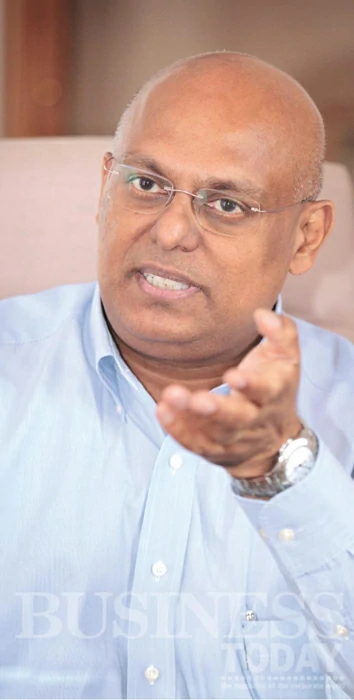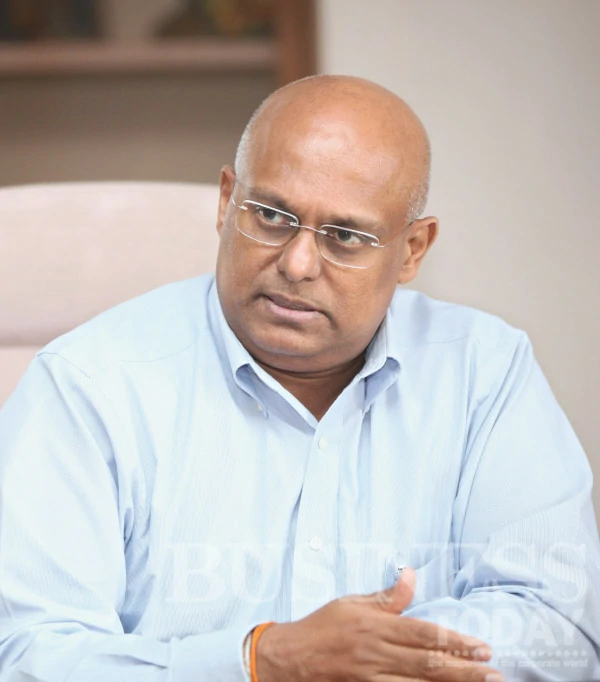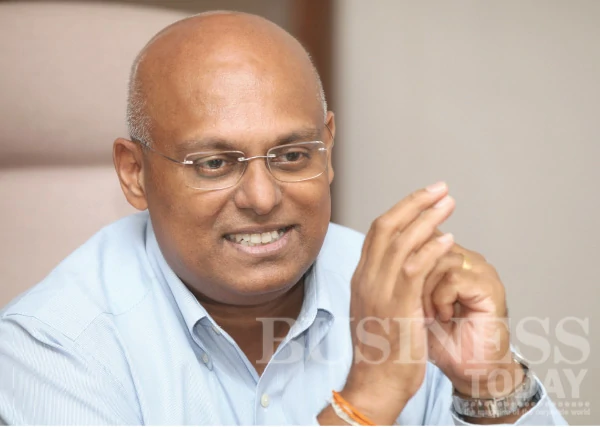
Suresh Shah is the incumbent Chairman of the Ceylon Chamber of Commerce (CCC), the apex body of the private sector. While he affirms that the private sector is the engine of growth, for them to perform further the ease of doing business should be better. But, things are improving and greater partnership between the private sector and public sector is seen. The country must always come first, he states. By working towards a common objective it will not be a few but the entire population who will benefit.
By Udeshi Amarasinghe
Photography Menaka Aravinda and Mahesh Bandara
You are completing a year as the Chairman of the Ceylon Chamber of Commerce, can you tell us about the progress made so far?
At the time the new office bearers took over, we first wanted to make a long-term agenda looking at a six year horizon. We said that we will make a six-year plan rather than a Chairman’s agenda. Secondly, we wanted to ensure closer cooperation between the trade chambers in Sri Lanka. Currently there are at least nine large trade chambers in addition to the Ceylon Chamber of Commerce. We need to drive much closer cooperation with those chambers and present a united private sector.
The Ceylon Chamber Of Commerce Is A Partner To The Government. And That Process Of Partnership Is With The Ultimate Objective Of Growth In The National Economy
Thirdly we identified the importance of getting more young people involved. As a step in that direction we formed a Young Leader’s Forum within our steering committee structure. Those in this steering committee are between the ages of 25 and 40. We were thinking of longer term succession as well when we formed this steering committee. We reviewed our existing steering committee structures and made certain changes. In addition to members of the private sector we also brought in experts from various fields; for example education and administration.These experts are not necessarily from the private sector, they are also from the public sector. The idea is to promote consultation and a forum to exchange ideas. Here we will be looking at a broader national perspective.
We also said that the Ceylon Chamber of Commerce is a partner to the government. And that process of partnership is with the ultimate objective of growth in the national economy and a better life for all Sri Lankans. We said that if we were to fulfill our role we need to engage with the government as well as other stakeholders. In the past the Chamber communicated its message via the media. But when you are working in a partnership it is much better that those messages are communicated one on one. We have focussed on that as well. We have one to one discussions where we present our point of view across very independently and transparently. We cannot do this through the media. That has been a fundamental shift.
What is the role of the Ceylon Chamber of Commerce?
The Chamber is a membership driven organisation. We have approximately 500 members. From that perspective, our main objective is to look at ways to assist our members with their requirements or promote their interests. That is only one aspect considering that although we are a member driven organisation we are also a public body. The public looks to the CCC and other chambers as well to offer direction in terms of how the economy functions.
Although membership driven, the CCC has many stakeholders. The government is one with whom we need to work in partnership. The CCC attempts to balance the needs and aspirations of all these stakeholders.To find balance we need to place the country first, particularly in terms of economic development, thereafter the sector and finally the organisation. That is how we prioritise to strike a balance. In essence the principle is, if the country develops and the economy does well, then all benefit.
The CCC is at the forefront of the private sector, the private sector is deemed as the engine of growth, is that true in Sri Lanka?
The private sector is indeed the engine of growth. In Sri Lanka investment hovers around 28 percent. The government component is about six percent and the balance comes from private sources. No one can escape the reality that the private sector is very much the engine of growth. It is the private sector that invests in manufacturing capacity, and produces jobs and exports. Economic activity at the end of the day is carried out by the private sector.
The question stems from the fact that of late, the government has shown involvement in greater economic activity than in the past. Previously it was more skewed towards policy but is now more active in the economic sphere.
There Is No Question That The Private Sector Will Take Advantage Of An Opportunity, Whenever Available. It Is In Our DNA To Do So
It is now five years since the end of the conflict, as the general public we feel the private sector to be moving slowly. What are your thoughts on this?
I would not say that. If you look at the numbers right after the end of the war when the economy grew above eight percent, the private sector activity increased substantially and that was reflected in the numbers. The private sector revenue as well as bottom lines grew. This indicates two things, one is that the private sector was and is active, and number two, when the economy and the country does well so does the private sector.
The private sector becomes active whenever it believes it can make money because, at the end of the day the role of the private sector is to create wealth through transactions. Whenever the opportunity presents itself the private sector will take it. There is no question that the private sector will take advantage of an opportunity, whenever available. It is in our DNA to do so.
How can the private sector perform better?
There are two aspects to consider, that is the larger Colombo based formal private sector and the SMEs. As such the factors differ based on the areas targeted. Overall for both the formal as well as the SME sector the ease of doing business is a constraint. I feel we have too many regulations in place. It is a modern economy and most of our regulations are outdated and may not fit today’s modern operating environments. Recently there was an instance where we had to obtain approval to export. We need to consider, if that is actually necessary from the country’s perspective. That is one area we need to focus on-the ease of doing business.
Sri Lanka’s Education System Is Not Geared To Cater To The Requirements Of The 21st Century… We Are Not Going To Reach Economic Prosperity By Looking Within Ourselves
The rates used to be an issue for the Colombo based private sector but now we see interest rates coming down to relatively manageable levels. If you borrow short-term today, that is fine as we are down to single digits. Inflation has gone down as well and positive development has taken place. From an SME perspective, access to finance is difficult. The banks are very focussed on lending based on security as well as the business plan. The SMEs may not have the skill to prepare those business plans. There is much to be done in that sphere.
Looking forward from a more sustainable perspective education is a significant factor. Sri Lanka’s education system is not geared to cater to the requirements of the 21st Century. We are a small country, and we are not going to reach economic prosperity by looking within ourselves. We need exposure to global markets and compete globally. That is a fundamental shift we have to make. Our eduction system does not produce people with the required set of skills to compete in the global market. Therefore we need to review our education system.
Sri Lanka has great potential, but we seem to be having difficulty in harnessing that potential, what are your thoughts on that?
The location does give us advantages, for instance we are a fantastic transshipment hub. We can also be a manufacturing hub possibly for the region. There are many locational advantages for Sri Lanka.
Sri Lanka needs to attract not just FDIs but those which have access to markets and the capacity to transfer technology to Sri Lanka. We cannot expect to become innovative overnight. That is not going to happen. However, we need to kick-start the process and technology transfer is significant in that regard. Attracting FDIs to Sri Lanka is a formidable challenge that we need to overcome.
What are the opportunities for the private sector to work with the public sector in the form of PPPs?
First and foremost it is in the policy area. We first need to enable ease of doing business and there are many challenges that we need to overcome. Take the ease of doing business index, Sri Lanka is number 85. That tells you that there’s much more scope for improvement to move into the 30s. There are countries that have made dramatic shifts. That is an area that we need to focus on in terms of public private partnerships.
Then there are policy related issues where the private sector and public sector can work together and resolve. There are many regulations that govern business activity in Sri Lanka, which are fairly dated. We can bring reforms in those areas. We need to work together. In the recent past a spate of regulations were introduced without consultation with the private sector. That is another area that we can work on. We can tell the government that we are not opposed to new regulations, but lets discuss them first and have a consultative process where the views of the private sector are taken into consideration as well.
Fundamentally What We Require Is An Environment Conducive To Doing Business… Take Steve Jobs Or Bill Gates, No One Did Them Any Favours But Allowed Them To Market Their Innovations In A Very Short Space Of Time
Of course for infrastructure development, the private sector has the capacity now to get more involved and work together with the government.
Can you elaborate on the government’s support to the Chamber as well as the private sector as a whole?
I do not believe that either the Chamber or the private sector need special favours, neither do I believe that we should be asking for any. Fundamentally what we require is an environment conducive to doing business. That includes good policies that do not change and are consistently implemented according to the rules and regulations in place and not subject to individual interpretation. Then, ease of access to finance at a reasonable cost. The CCC and the private sector only ask for a conducive environment, nothing special. I do not feel we need to reduce taxes any further. For instance when the electricity tariffs were increased, the private sector did not protest, we actually agreed that it was a good move.
Long-term, the private sector needs to be competitive. We need to build our competitive strengths which will not be possible if we go around asking for favours. All we must ask for is a conducive business environment and within that environment we must build our own capacity to compete. Favours will only benefit a few but a good business environment will benefit everyone and that is what is important. Take someone in a village who has just graduated from university. He does not have the capacity to ask for favours from anyone but the only thing he can depend on is a level playing field. Take Steve Jobs or Bill Gates, no one did them any favours but allowed them to market their innovations in a very short space of time. It is the opportunity and the level playing field that are required to develop the entrepreneurial spirit and culture.
There are some public sector officials who are very approachable and there are others who are not. At the end of the day they might look at the CCC as a body that has not been supportive in the past-that could be one of the reasons. But both as member and also from a public sector and private sector perspective we need to realise that we are partners on the same journey. It is like a cricket team, where at the end of the day all 11 players have to contribute. We need to understand that as well. Unless we all contribute towards one journey, as a country we are not going to reach our full potential. There is much more room to improve that relationship between the private sector-represented not only by the CCC but other trade chambers-and the public sector. We have a role and a responsibility to ensure that it does happen.
What can you tell us about the tax structures, as well as the CCC relationship with the Department of Inland Revenue?
Looking at the rates of taxation in the country-the corporate tax and income tax rates-they have got it right. If at all, reforms are required with regard to revenue related tax because there are too many of them. If we can amalgamate all into one that would be more efficient. It is actually not the rates but the number of taxes that remains the problem. There is scope and space to reduce the number of taxes. If you look from a rates perspective we are doing fine.
We are still dependent on exemptions to drive FDIs. As a country we need to move away from that. By giving tax exemptions we distort market activity and the competition. At the same time to attract investment Sri Lanka has had to rely on tax incentives in the past. We have to move away from that as well.
There Are Huge Opportunities. To Bring Those Opportunities To Fruition, The Private Sector And The Public Sector Must Work With A Common Objective
The real issue is that government revenue has been declining.We need to widen the tax net and have better implementation where people who have to actually pay their taxes, do so. We strongly recommend a process and a system that brings everyone into the tax net. The country needs to look at that because unfortunately what happens is that when people who have to pay taxes do not pay it is the people who are further burdened. This is not good for the economy.
The Chamber has a very good relationship with the Department of Inland Revenue and we meet them on a regular basis. The problem is that regulations are being introduced in an ad hoc manner without consulting the private sector. Then we have to start reacting. If there is a process of consultation then we can offer our point of view and make it a more robust system. And, if we know the objective then we will also be able to make suggestions so that it is mutually beneficial.
Final thoughts?
Sri Lanka has tremendous potential. No other country has our geographical advantage. We are ten nautical miles away from the worlds busiest sea route. Asia is to be the next economic force and everything that moves between Asia and Europe has to pass Sri Lanka. That must be a tremendous advantage. We have a very rich culture, which makes us a very educated people not necessarily in the sciences but a culture that has developed over 2,500 years. It is in our DNA and that must count for something. We must leverage on that. We have great ocean resources where we are not even aware of our full capacity.
On the other hand is our proximity to India. India at some point with its 1.25 billion population where the majority is young, is going to be a huge economic force in the foreseeable future. It has the potential to be at least the world’s second largest economy. It can even surpass China at some point because of its young work force. We need to take advantage of that proximity to India. If we take two examples from the past, Hong Kong’s proximity to China made Hong Kong what it is today and Singapore’s proximity to South East Asia made it what it is today. Similarly Sri Lanka has the opportunity with India.
Sri Lanka has a massive tourism potential. Today, we are attracting only about 1.2 million tourists. Our potential I feel is simply ten million. Most hoteliers will say we do not need ten million but that really is our potential. In a country of 20 million people if we have ten million in tourism numbers the country can boom. These are huge opportunities. To bring those opportunities to fruition, the private sector and the public sector must work with a common objective that we want to take this country from where it is now to something better than what we are even thinking of.
It is very important that we take the underprivileged on this journey. Economic growth and the numbers need to trickle down to the underprivileged people in our society, particularly in the form of education and health. By empowering them they will be able to take charge of their lives and be productive.







